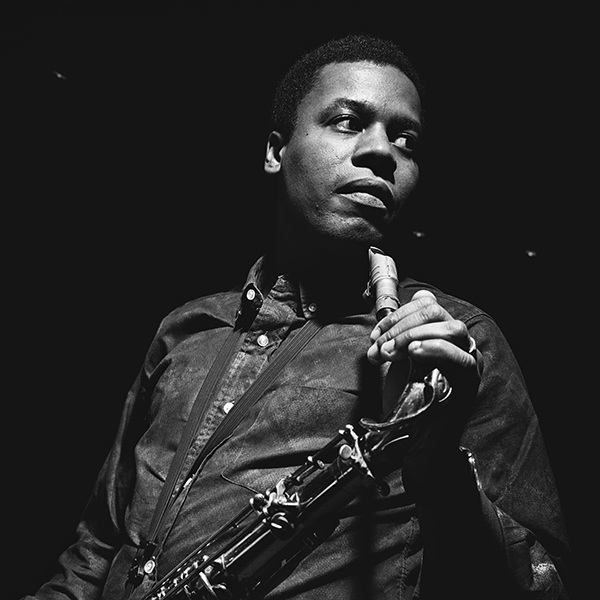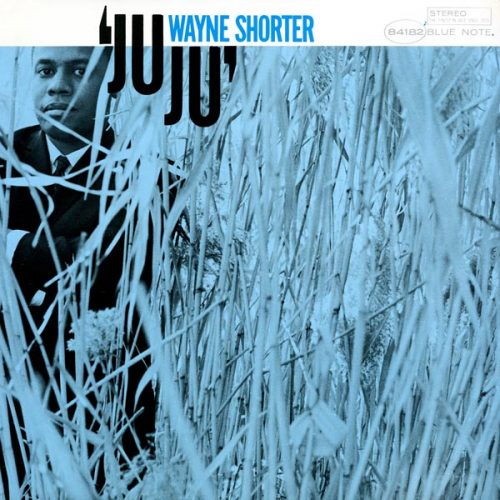August 21, 2024
By Dan Ouellette
Philosopher, poet, and shaman of jazz, tenor saxophonist Wayne Shorter followed up on his 1964 debut for Blue Note, Night Dreamer, with another timeless album, JuJu, recorded a mere three months later on August 3 at Rudy Van Gelder’s studio. After five years as saxophonist and composer/musical director with Art Blakey’s Jazz Messengers—a considerably long tenure with the band that usually experienced a rapid-fire turnover of personnel—Wayne was making another major statement in support of his solo career as a leader, striving to stretch further after operating within the confines of Blakey’s ensemble format. In Michelle Mercer’s 2004 biography, Footprints: The Life and Music of Wayne Shorter, the saxophonist called the Blakey mode of performing and recording as the “bish-bash, sock’em dead routine.”
Even though Wayne was driven by the freedom that a solo career offered him, he had been warned against going it alone as a leader because as he had once told me, when push came to shove, jazz club owners would more likely book a “guarantee” like Dizzy Gillespie than take a chance with a relative unknown who might not secure a house based solely on his own artistry. That, certainly, was for the future.
So rather than fully committing himself to going it alone, while he was recording JuJu, he had already decided to finally give in to Miles Davis’ insistent invitation to join his band. In a sense that was the perfect guarantor of greater exposure that would better prepare him for his eventual, long-in-coming solo life. He linked up with Miles and the rest of the quintet a month after recording JuJu.
With JuJu, showcasing six of his new pieces, Wayne projected himself as a seeker pursuing more depth, more compositional freedom to follow what he was intuitively imagining. In the original liner notes, writer Nat Hentoff characterized Wayne as possessing a “controlled passion” that was fueled by “ceaseless curiosity.” Reissue liner notes writer Bob Blumenthal in 1999 described Wayne’s unique style as coming from a mind that was “highly analytical yet suffused with the fantastic.” All of which pointed to the personality of a restless artist ready to break out, which he dynamically achieved with JuJu.
Wayne enlisted the same rhythm section as Night Dreamer—pianist McCoy Tyner, bassist Reggie Workman, and drummer Elvin Jones—who he felt were fully equipped to flow with the idiosyncrasy of his music. This time it would be a quartet with Wayne’s tenor saxophone the only horn, a decision that not only allowed the saxophonist more sonic space but also gave McCoy the license to break out on several of the tracks, including the ebullient title track and on the lyrical “Deluge,” where he solos with a relaxed yet scintillating run (followed by Elvin’s rumble over Reggie’s firm foundation).
Wayne’s performance is confident throughout, with his urgent yet cavorting tenor saxophone voicing on “JuJu” and his spontaneous, raspy inventions on “Deluge.” He lopes in a yin-yang style on “Yes or No,” with a conversational tone that is eclipsed in stretches by an argumentative saxophone snarl. The film noir-like “House of Jade” is the low-lights gem of the album with its slight tempo advance midway when Elvin slowly emerges from the quiet drum zone.
What makes JuJu so particularly delightful are the two playful tunes Wayne delivers: “Mahjong,” inspired by the architecture of the ancient Chinese board game, and “Twelve More Bars to Go,” a whimsical tale structured as a 12-bar blues about a drunk literally making the stumbling rounds of twelve drinking holes.
JuJu stands as a classic album in its own right, but also importantly paved the way to what’s around the bend in 1965 in his solo life after Wayne had settled into the quintet for the ages.
Get the Classic Vinyl Edition of JuJu on the Blue Note Store







